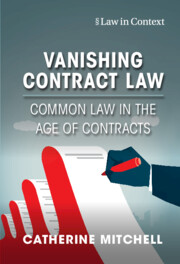Book contents
- Vanishing Contract Law
- Law in Context
- International Journal of Law in Context: A Global Forum for Interdisciplinary Legal Studies
- Vanishing Contract Law
- Copyright page
- Contents
- Preface
- Acknowledgements
- Table of Cases
- Table of Statutes
- 1 Vanishing Contract Law
- 2 Contract Common Law Trends
- 3 Contractualisation and the Common Law Retreat
- 4 Private Ordering, Regulation and Contract Law
- 5 Contracts through the Gaps
- 6 Future Challenges for Contract Law
- 7 The Possibility of Common Law Revival
- 8 Conclusion
- Select Bibliography
- Index
6 - Future Challenges for Contract Law
Published online by Cambridge University Press: 25 August 2022
- Vanishing Contract Law
- Law in Context
- International Journal of Law in Context: A Global Forum for Interdisciplinary Legal Studies
- Vanishing Contract Law
- Copyright page
- Contents
- Preface
- Acknowledgements
- Table of Cases
- Table of Statutes
- 1 Vanishing Contract Law
- 2 Contract Common Law Trends
- 3 Contractualisation and the Common Law Retreat
- 4 Private Ordering, Regulation and Contract Law
- 5 Contracts through the Gaps
- 6 Future Challenges for Contract Law
- 7 The Possibility of Common Law Revival
- 8 Conclusion
- Select Bibliography
- Index
Summary
This chapter explores some of the current and future pressures on contract law that are likely to reinforce its formalist and commercialist tendencies. The first of these is the recasting of contract law as a commodity that should primarily serve the interests of commercial contractors (usually by upholding the terms of the contract) at the expense of doctrinal development. The second is the declining use of adjudication to resolve disputes, rooted in lack of support for litigation and the emphasis on non-adjudicative dispute resolution within courts themselves. The third factor is the increasing automation of contract processes, manifest in the development of ‘smart contracts’ and algorithmic contracting. These innovations are likely to require revision of the foundational understandings upon which contract law is built, notably around how contracts are created, by whom and for what purposes.
- Type
- Chapter
- Information
- Vanishing Contract LawCommon Law in the Age of Contracts, pp. 146 - 174Publisher: Cambridge University PressPrint publication year: 2022

